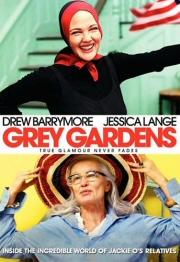- Drama
- 2009
- Buy the DVD
All photos © HBO
Reviewed by Ross Ruediger
()
hen “Grey Gardens” premiered on HBO earlier this year, I was telling a friend how good it was and how he really needed to watch it. He refused on two counts, the first being a slavish devotion to the original documentary upon which it’s based, and the second being Drew Barrymore, whom he hyperbolically declared to be “everything that’s wrong with cinema today.” I spoke with him earlier this evening, before sitting down to write this review. Seems his girlfriend rented it over the weekend and he caved. Good thing, too, because he really enjoyed it and appears to have a newfound respect for Miss Barrymore, offering her the highest praise with the simplest of critiques: “She was Little Edie!”
While it helps from a contextual standpoint to have seen the 1975 doc of the same name, it isn’t necessary for an appreciation of “Grey Gardens.” Albert and David Maysles’ original piece was the 100-minute culmination of various interviews given to the brothers by Edith “Big Edie” Ewing Bouvier Beale and her daughter, Edith “Little Edie” Bouvier Beale, who lived together in a decaying mansion in the East Hamptons. The name Bouvier is the key here: they are the aunt and cousin of one Jacqueline Bouvier Kennedy Onassis. The pair lived in squalor for decades, surrounded by cats and raccoons. When the National Enquirer exposed the situation in the early ‘70s, Jackie O. felt the need to help her relatives by fixing up the house and (presumably) providing them with some financial support. This is all dramatically reenacted in the film (Jeanne Tripplehorn cameos as Jackie O.), and it’s the real reason for making it in the first place: to give viewers a taste of the years and events that led up to the Beales as presented by the Maysles.
The movie mostly alternates between the present of 1973, with the Maysles (played by Arye Gross and Justin Louis) recording their documentary, and a chronicle of the past which begins all the way back in 1936, where we’re introduced to a much lovelier pair of women than are shown at the start. (Hey, that’s aging for you.) All that’s expected of Little Edie (Barrymore) is that she should find a man, although that isn’t really what she wants. No, she dreams of being an actress and a dancer. Meanwhile, Big Edie (Jessica Lange) is something of an unsuccessful singer who lives in her own dream world, and neither woman ever seems to behave as patriarch Phelan (Ken Howard) would like for them to. The years move forward, other men enter their lives, and many dreams are crushed, but eventually it’s just the two of them living together in a big empty house, co-dependent on each other for mutual support and criticism. Alongside ample doses of humor, it’s often a heartbreaking story, but this film aims to provide a shining, hopeful light at the end of the tunnel – one that the Maysles piece didn’t have access to.
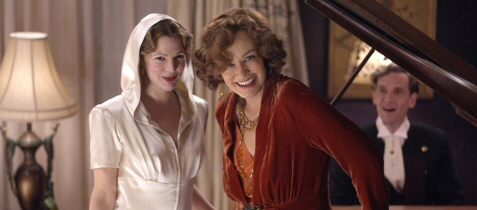
The thing about the two Edies is not just that they’re a couple of old cat ladies; it’s that they’re two of the most wildly eccentric personalities ever committed to film, only they probably don’t realize it. They think they’re entertaining and deserving of being the central subjects of a movie, which, all things being equal, they most certainly are. Lange and Barrymore inhabit their characters so thoroughly that anyone who doesn’t appreciate their work here is being curmudgeonly just for the sake of it. We expect Lange to be a great actress, and she is once again here, but we’ve never, in her long career (which, oddly, isn’t all that much shorter than Lange’s), seen Barrymore shine as she does in “Grey Gardens.”
According to the film’s producers, she shut herself off from contact with friends and family for the entire duration of the film’s three month shoot, just so she could get into the isolated mindset of Little Edie. It’s unquestionably the best work she’s ever done, and hopefully it’ll spur her on to even more daring work. The film recently snagged a whopping 17 Emmy nominations; it’ll probably win more than one, but I’d bank on Barrymore taking home the award for Outstanding Lead Actress in a Miniseries or Movie, even though, predictably, Lange is nominated in the same category. It’s not that Lange isn’t as good, but this retelling is subtly geared toward making Little Edie’s side of the story feel more central, which becomes all the more obvious in the last 15 or so minutes of the film.
Aside from the actresses, there’s a fair amount of other stuff to appreciate about “Grey Gardens.” First and foremost, credit must be given to director Michael Sucsy, who, against all logical odds, brought this entire thing to life. (The sheer amount of work put into recreating the details of the house alone is impressive.) His melancholy vision is the ideal bookend to the Maysles documentary, and it’s difficult to imagine anyone seeing either film and not being impressed by the results after viewing the other. (Actually, there’s even a third film, “The Beales of Grey Gardens,” which was compiled from unused footage from the Maysles original; it was released in 2006 and is available from Criterion.) Rachel Portman delivers a beautiful score that’ll stick with you long after the end credits roll. Finally, there’s the make-up, which transforms both Lange and Barrymore for more than half the movie. Old age make-up is always a slippery slope for filmmakers to navigate, and while I wouldn’t say that it’s perfect here, it’s still pretty damn good and is no doubt helped by the fact that Big Edie and Little Edie looked pretty strange in their later years in the first place.
Special Features: There’s a very informative commentary track from Sucsy and executive producers Lucy Barzun Donnelly and Rachael Horovitz which goes a long way toward tracing how the team put the movie together based on anecdotes and letters and so forth. It’s very revealing stuff and well worth a listen, but it’s still a huge shame we don’t get to hear Barrymore and Lange, which would’ve been the ideal addition to this DVD. The only other feature is an 11-minute HBO doc called “Grey Gardens, Then & Now,” which compares the new film to the Maysles doc, and features brief interviews with Lange, Barrymore, Albert Maysles and Sucsy. This is a nice little tidbit for people who’ve never seen the Maysles piece, since it includes snippets from the original – and if you have seen the original doc, it’s still a neat piece as it shows how damned good the recreations are when placed next to the real deal.
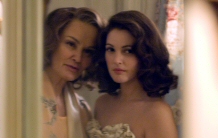 |
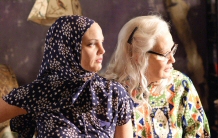 |
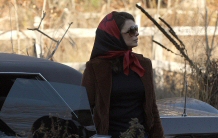 |
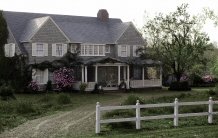 |
You can follow us on Twitter and Facebook for content updates. Also, sign up for our email list for weekly updates and check us out on Google+ as well.













